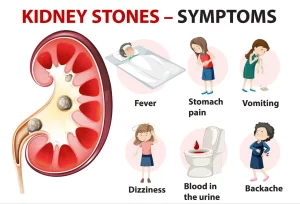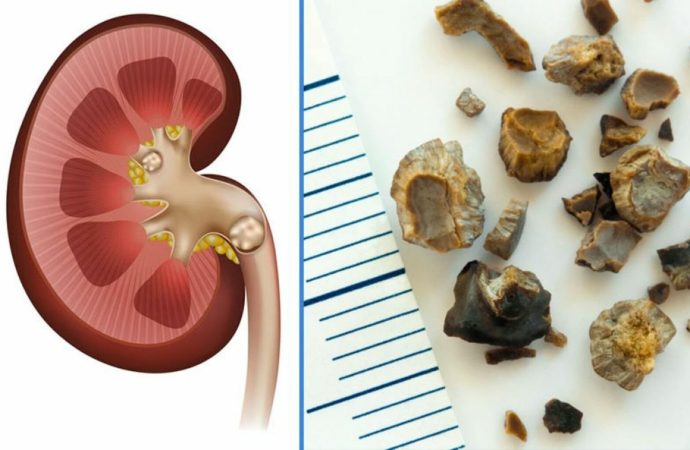Introduction Kidney stones are a common health issue affecting millions of people worldwide. These small, hard mineral deposits that form in the kidneys can cause excruciating pain and discomfort when they obstruct the urinary tract. While medical interventions such as lithotripsy or surgical removal are often necessary for larger stones, there are natural methods that
Introduction
Kidney stones are a common health issue affecting millions of people worldwide. These small, hard mineral deposits that form in the kidneys can cause excruciating pain and discomfort when they obstruct the urinary tract. While medical interventions such as lithotripsy or surgical removal are often necessary for larger stones, there are natural methods that may help facilitate the passage of smaller stones, providing relief and avoiding more invasive procedures.
Understanding Kidney Stones
What Are Kidney Stones?
Kidney stones, also known as renal calculi, are solid masses made up of crystals that form in the kidneys. They can vary in size, ranging from as small as a grain of sand to as large as a golf ball. The composition of kidney stones can differ, with the most common types being calcium oxalate, uric acid, struvite, and cystine stones.
Causes and Risk Factors
Several factors contribute to the formation of kidney stones, including:
- Dehydration: Insufficient fluid intake can lead to concentrated urine, increasing the risk of stone formation.
- Dietary Factors: Consuming foods high in oxalates, sodium, or animal proteins may promote stone development.
- Genetics: A family history of kidney stones can predispose individuals to the condition.
- Medical Conditions: Certain medical conditions such as urinary tract infections, gout, and hyperparathyroidism can increase the likelihood of stone formation.
- Medications: Some medications may contribute to the formation of kidney stones as a side effect. Explore More About (Age vision Disorder)
Symptoms
The symptoms of kidney stones can vary depending on their size and location within the urinary tract. Common signs and symptoms include:
- Severe Pain: Pain in the back, side, abdomen, or groin that may come in waves and intensify over time.
- Urinary Changes: Discolored urine, blood in the urine (hematuria), and frequent urination.
- Nausea and Vomiting: Some individuals may experience nausea and vomiting due to the intense pain.
- Urinary Tract Infections: Kidney stones can increase the risk of urinary tract infections, leading to symptoms such as fever and chills.

Image by: yendex.com
Natural Methods for Kidney Stone Passage
While medical interventions are often necessary for larger kidney stones, smaller stones may pass through the urinary tract naturally with the help of certain home remedies and lifestyle modifications. Here are some effective strategies:
Hydration
Increasing fluid intake is crucial for preventing kidney stone formation and facilitating stone passage. Water is the best option, as it helps dilute urine and prevents minerals from crystallizing and forming stones. Aim to drink at least eight glasses of water per day, and consider adding lemon juice to your water, as it may help break down stones.
Dietary Changes
Making dietary modifications can reduce the risk of kidney stone formation and aid in stone passage. Some dietary recommendations include:
- Reduce Sodium: High sodium intake can increase urinary calcium excretion, contributing to stone formation. Limit your sodium intake by avoiding processed foods and opting for fresh, whole foods instead.
- Moderate Oxalate Intake: Certain foods high in oxalates, such as spinach, nuts, and chocolate, can contribute to calcium oxalate stone formation. While it’s not necessary to eliminate these foods entirely, consuming them in moderation may be beneficial.
- Increase Calcium: Contrary to popular belief, adequate calcium intake from dietary sources may actually reduce the risk of kidney stones by binding to oxalates in the digestive tract and preventing their absorption. Good sources of calcium include dairy products, leafy greens, and fortified foods.
Herbal Remedies
Several herbs have been traditionally used to promote kidney health and facilitate the passage of kidney stones. Some popular herbal remedies include:
- Chanca Piedra: Also known as “stone breaker,” chanca piedra has been used for centuries in traditional medicine to dissolve kidney stones and promote urinary tract health.
- Dandelion Root: Dandelion root is believed to have diuretic properties, increasing urine production and potentially aiding in the expulsion of kidney stones.
- Nettle Leaf: Nettle leaf may help prevent urinary tract infections and reduce inflammation in the kidneys, supporting overall kidney function.
Lifestyle Modifications
In addition to dietary changes and herbal remedies, certain lifestyle modifications can promote kidney stone passage and prevent recurrence. These include:
- Regular Exercise: Engaging in regular physical activity can help maintain a healthy weight and reduce the risk of stone formation.
- Limit Alcohol and Caffeine: Alcohol and caffeine can lead to dehydration, so it’s essential to consume them in moderation and increase fluid intake accordingly.
- Manage Stress: Chronic stress can contribute to various health problems, including kidney stones. Practice stress-reducing techniques such as mindfulness, meditation, or yoga to promote overall well-being.

Photo by: www.pexels.com
When to Seek Medical Attention
While natural remedies can be effective for smaller kidney stones, it’s essential to seek medical attention if you experience severe or persistent symptoms. Additionally, certain situations warrant immediate medical care, including:
- Inability to Pass Urine: If you’re unable to urinate due to a kidney stone blocking the urinary tract, seek emergency medical attention.
- Persistent Pain: Severe or persistent pain that does not improve with home remedies may indicate a larger stone or complications requiring medical intervention.
- Signs of Infection: Fever, chills, and urinary symptoms such as burning or urgency may indicate a urinary tract infection, which requires prompt treatment.
Conclusion
In conclusion, while kidney stones can be incredibly painful and disruptive, natural methods such as hydration, dietary changes, herbal remedies, and lifestyle modifications can help facilitate their passage and prevent recurrence. However, it’s essential to consult with a healthcare professional for proper diagnosis and treatment, especially in cases of severe or complicated kidney stones. By incorporating these natural approaches into your daily routine, you can support kidney health and minimize the risk of stone formation.
















